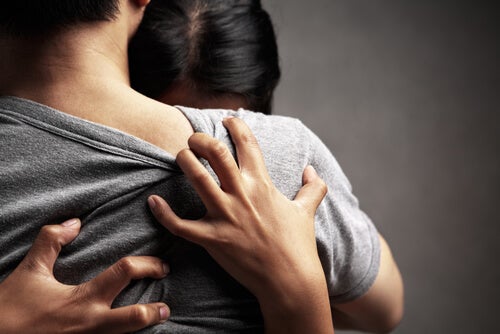How Can People Who Haven't Been Loved Learn to Love?

A lack of love leaves a lasting impact on human development. People who haven’t been loved structure much of who and what they are around this deficiency. A lack of love is, in and of itself, a form of abuse. It has a huge influence on people’s self-image and perception of reality.
The consequences can determine the course and quality of a person’s life. Each stage of development is a reflection of its effects. A child who isn’t loved enough tends to be shorter and weigh less. In addition, they have lower academic performance and respond to things with more fear and aggressiveness than other children. During adolescence, teens who haven’t been loved enough are more rebellious and vulnerable to peer pressure. They’re also more prone to addiction.
“For there’s merely bad luck in not being loved; there’s misfortune in not loving.”
-Albert Camus-
People who haven’t been loved enough reach adulthood with a number of disadvantages. It’s hard for them to know who they are. As a result, they have a hard time finding their purpose in life and their place in the world… They feel uncomfortable and unsatisfied. Another significant consequence is related to relationships, both romantic and platonic. In short, a lack of love can be devastating.

Mistrust
People who haven’t been loved tend to approach most things with fear. That’s because one of the effects of love is safety and stability. Consequently, a lack of love leads to the opposite, and it makes people feel as if they’re living at the edge of an abyss.
This feeling manifests itself as distrust. You don’t trust yourself and you trust others even less. You’re suspicious of anything that involves love. It’s hard to have spontaneous relationships with other people, and they make you feel very tense.
This distrust tends to worsen when love comes into the picture. If they start to get closer to someone, or there’s a potential for intimacy, people who haven’t been loved go on high alert. The possibility of love leads them to run away, close themselves off, or become obsessed.
Idealization and obsession
One of the most significant effects of a lack of love is that it leads to an unconscious and disproportionate idealization of love. You start to have fantasies that love has the power to save you or repair what’s broken. The idea that love will finally make you feel fulfilled and whole takes over. Also, people who haven’t been loved tend to have unrealistic expectations about what another human being will be able to provide them.
If you haven’t been loved, you might go a little crazy when you find love during your adult life. You aren’t sure what to do with it and you can’t just go with the flow. It’s hard for you to approach it naturally, which is why you develop obsessions.
What usually happens is that people who haven’t been loved end up become obsessed with their significant other. They develop an unhealthy attachment. It’s as if they want the other person to take responsibility for them, which is what their mother or father should have done during childhood. As a result, they can be very demanding, distrusting, and controlling partners. Love becomes a huge problem for them.
Is there a way out?
Unfortunately, people who haven’t been loved tend to have significant problems with love. They don’t consider it something that enriches their life. Instead, it fills them with anxiety. Consequently, they often sabotage their own relationships with their fears, demands, mistrust, and self-isolation. And if they have a bad experience with love, they might just try to avoid it for the rest of their lives.

The only way out of this painful situation is to restructure your emotional life. This is very hard to do without professional help. The process involves returning to those stages in your life when the damage was done. You have to face your trauma and heal to whatever extent possible.
The trauma will always be there in some capacity but if you learn to cope with it, it’ll be much easier to identify where it hurts, how it hurts, and what to expect. The probability of having healthy relationships will also increase significantly. With a lot of emotional work and some help, those open wounds can finally heal.
All cited sources were thoroughly reviewed by our team to ensure their quality, reliability, currency, and validity. The bibliography of this article was considered reliable and of academic or scientific accuracy.
- Machín Suárez, R., & Santana Romero, L. D. L. C. (2017). Hijas del desamor. Efectos de la perversión femenina materna en la constitución subjetiva de sus hijas.
This text is provided for informational purposes only and does not replace consultation with a professional. If in doubt, consult your specialist.








